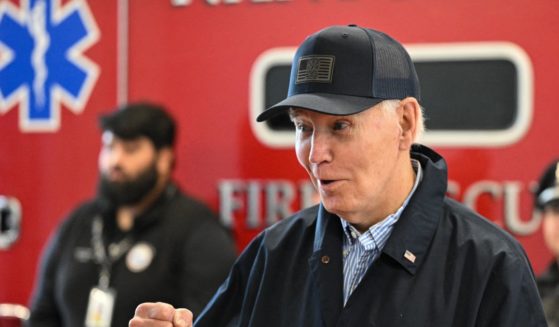After Moon Landings Ended, NASA's New Mission Was Pushing Global Warming Agenda, Says Climatologist
Belief in catastrophic anthropogenic climate change within the scientific community has become a sort of state-sponsored creed in a country where deviance from any portion of catechism is gravely punishable.
It’s not even limited to the scientific community anymore, either. Any politician or pundit who expresses doubt about the mechanisms of climate change, the degree of impact it will cause or the meliorative effect of supranational agreements like the Paris accords is branded a “climate denier,” a loaded phrase no doubt picked because of its associations with Holocaust denial.
When it comes to scientists, Judith Curry is one of the highest-profile heretics in the game.
“Curry is a true climatologist,” Guy Sorman wrote in a recent profile of Curry in City Journal, published by the conservative Manhattan Institute for Policy Research. “She once headed the department of earth and atmospheric sciences at the Georgia Institute of Technology, until she gave up on the academy so that she could express herself independently.”
And that isn’t possible in today’s academic climate, Curry told Sorman.
“Independence of mind and climatology have become incompatible,” she said.
Curry said that while the earth is getting hotter, the mechanisms are poorly understood.
“There is warming, but we don’t really understand its causes,” she said. “The human factor and carbon dioxide, in particular, contribute to warming, but how much is the subject of intense scientific debate.”
The City Journal interview touches on a number of interesting topics, and I advise you to read it in full if you get the chance. However, one of Curry’s most interesting theories — and one that’s not exactly evidence-free — is that NASA played a major role in shaping the narrative that carbon dioxide was the primary culprit for global warming because it needed a mission once the moon landings were over.
The narrative, Curry says, sprang out of the 1973 oil embargo, which stoked fears regarding fossil fuels.
Curry argues that the nuclear lobby began financing pressure groups that made atomic power look like a suitable alternative to burning oil, gas or coal. Part of this was the idea that carbon dioxide was harmful to the environment. And, as it turns out, those groups had a very powerful friend in government.
“The National Aeronautics and Space Administration played a role in the propagation of that narrative,” Sorman wrote.
“Having ended its lunar expeditions, NASA was looking for a new mission, so it built some provisional climate models that focused primarily on carbon dioxide, because this is an easy factor to single out and ‘because it is subject to human control,’ observes Curry.”
That mission seems to continue today. NASA spends over $100 million annually on carbon monitoring, according the agency’s administrator, despite the fact that the Trump administration has tried to cut the program entirely.
Going to NASA’s webpage on climate change, you can also take in plenty of alarmist articles (“Antarctica’s Brunt Ice Shelf prepares to calve iceberg” and “Fire below, ice above: volcanoes, glaciers and sea level rise” are two of the facile offerings you can look through at the moment). It’s basically proof in HTML form that there’s nothing more dangerous than a bureaucrat looking for something to do.
And NASA’s emphasis on carbon dioxide was enough to convince others that carbon dioxide was responsible for global warming.
“Even though it is just one among many factors that cause climate variations, carbon dioxide increasingly became the villain,” Sorum wrote. “Bureaucratic forces at the UN that promote global governance — by the UN, needless to say — got behind this line of research. Then the scientists were called upon and given incentives to prove that such a political project was scientifically necessary, recalls Curry. The UN founded the Intergovernmental Panel on Climate Change (IPCC) in 1988 to push this agenda, and ever since, climatologists — an increasingly visible and thriving group — have embraced the faith.
“In 2005, I had a conversation with Rajendra Pachauri, an Indian railway engineer, who remade himself into a climatologist and became director of the IPCC, which received the 2007 Nobel Peace Prize under his tenure,” Sorum continued.
“Pachauri told me, without embarrassment, that, at the UN, he recruited only climatologists convinced of the carbon-dioxide warming explanation, excluding all others. This extraordinary collusion today allows politicians and commentators to declare that ‘science says that’ carbon dioxide is to blame for global warming, or that a ‘scientific consensus’ exists on warming, implying that no further study is needed — something that makes zero sense on its face, as scientific research is not based on consensus but on contradictory views.”
But then, contradictory views aren’t much tolerated these days. The high priests of climate change aren’t just in science and academia anymore, but also in politics (former Vice President Al Gore’s screed “Earth in the Balance” was first published back in 1992) and in government agencies that are supposed to be tasked with space exploration.
All of that helped set the stage for the stifling climate around climate science that Curry describes.
“Climatology has become a political party with totalitarian tendencies,” Curry says told Sorum.
“If you don’t support the UN consensus on human-caused global warming, if you express the slightest skepticism, you are a ‘climate-change denier,’ a stooge of Donald Trump, a quasi-fascist who must be banned from the scientific community.”
Such are the punishments for not having the one true faith, it seems.
Truth and Accuracy
We are committed to truth and accuracy in all of our journalism. Read our editorial standards.
Advertise with The Western Journal and reach millions of highly engaged readers, while supporting our work. Advertise Today.












